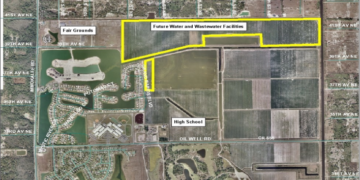With a $301,800 county code enforcement lien against his Oakes Farms warehouse in East Naples, mega grocer Alfie Oakes couldn’t sell it without a clear title.
Oakes, who also owns Seed to Table, Food & Thought and other businesses, tried for years to settle the case, but it dragged on for five years due to issues with the Collier County attorney.
The two-story 18,271-square-foot warehouse at 4176 Mercantile Ave. in Airport Industrial Park is listed for $6.5 million and features office space, a breakroom and restrooms, a warehouse, cold storage on two floors, a parking lot and a generator to ensure uninterrupted power during outages. Built in 2008, it’s been renovated with numerous upgrades.
Oakes’ land-use attorney, Rich Yovanovich, told the Board of County Commissioners on May 13 that closing with a buyer is set for May 27, so they have to settle the lien. He said he’d met with Development Review Director Jaime Cook, Growth Management Department Head Jamie French and Code Enforcement Director Tom Iandimarino a day earlier and they came up with “the right fine.” Staff also met separately with commissioners.
A February 2020 complaint alleged there were unpermitted improvements to the half-acre lot, including a parking-lot expansion and alterations to the stormwater swale. A county investigation also found that a recorded conservation easement, initially required under the approved 2005 site plan, had been “inadvertently disturbed.”
“When the property was first developed by a previous property owner in 2005, it was required,” Cook told commissioners. “The board removed this requirement on industrial-zoned parcels about six years later.”
In 2011, commissioners approved a change to the land development code to remove a native-vegetation retention requirement for industrial-zoned parcels. Oakes, who purchased the property in 2012, repeatedly tried to settle the case, but a contribution to Conservation Collier wasn’t feasible. In September 2022, the county’s Special Magistrate imposed a $120,511.90 lien that accrued daily.
In February, commissioners unanimously voted to vacate the property’s easement.
Since fines wouldn’t exist if the county vacated it due to the code change, Yovanovich initially suggested a $111.90 settlement representing already-paid lien costs. But county staff suggested $242,711.60, 10% of the property’s appraised value, a policy used “when enforcement efforts have been diligently pursued and compliance achieved, particularly under financial duress or changed circumstances.”
That was the settlement listed in the publicized agenda, but after staff asked commissioners to discuss it, Oakes got a better deal, $5,000.
Board Chair Burt Saunders told staff to “make sure that whatever fee is assessed is what would normally be assessed under all these circumstances.” Cook pointed out the board’s policy only allows staff to recommend 10% of the appraised value.
“The property owner did attempt to come into compliance by requesting both to amend the site development plan and to vacate the conservation easement,” she said. “What the property owner is requesting now is what would be required of any other property owner that clears without first obtaining a permit, which is double the application fee.”
Oakes already paid a $2,500 application fee, Cook said, so he’d have to pay another $2,500 for an after-the-fact application fee to settle it. She called it a “unique code enforcement case,” noting that out of 1,795 industrial-zoned parcels countywide required to have a conservation easement when developed, this is only one of two with an easement — and staff supports the settlement.
Commissioner Rick LoCastro noted it likely would go viral on Facebook, so residents need to understand “all the moving parts” and that staff “did a deeper dive.”
“This is a unique case and we’re trying to do what’s fair, so it doesn’t matter where they live, who they are, what their name is or anything like that,” LoCastro said, noting he was one of the commissioners who pushed for a resolution to tighten up fines. “A lot of times, the amount of dollars builds up just automatically while it’s trying to be worked out. … Any dollars that we collect go back to the taxpayers.”
Vice Chair Dan Kowal, whose district covers the property, noted staff realized it was futile to require the easement, so it no longer exists. Commissioners unanimously approved the settlement, and Yovanovich said they’d pay it immediately.
In an interview afterward, LoCastro said he asked to meet with staff to answer questions, and they met with all commissioners separately a day earlier.
“[Staff] all said the same thing — that they were recommending $5,000 because of several things that weren’t done correctly on both sides and regardless of who the property owner was, they would be recommending a $5,000 penalty rather than the fees that incrementally added up over time automatically while they were trying to figure out the issue,” LoCastro added.
Saunders said he asked staff what they’d charge Oakes based on all the circumstances involving an easement that’s no longer required, and they all agreed it should be $5,000.
“I said, ‘Well, I don’t want to look like I’m caving to Alfie Oakes, and I don’t want it to look like I’m trying to punish Alfie Oakes,” Saunders said, noting he told staff a settlement was delayed due to issues with the County Attorney’s Office. “The county attorney is the one who delayed things for years and years and years, which meant the fine kept getting bigger and bigger.”
Neither County Attorney Jeff Klatzkow nor Oakes responded to requests for comment.
The settlement was among several reductions approved that day, including a lien that was reduced to nothing.





